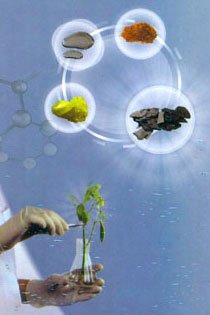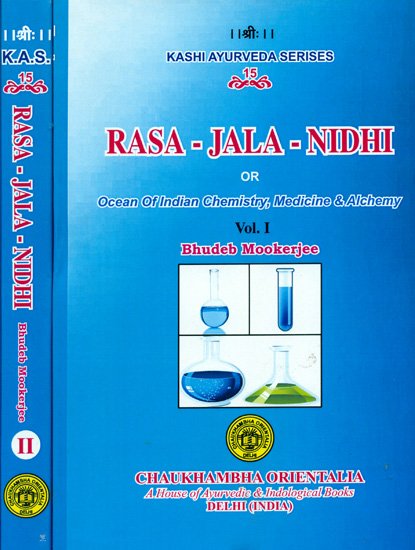Rasa Jala Nidhi, vol 5: Treatment of various afflictions
by Bhudeb Mookerjee | 1938 | 63,627 words | ISBN-10: 8170305829 | ISBN-13: 9788170305828
This fifth volume of the Rasa-jala-nidhi deals with the symptoms, treatment and dietary prescriptions of various afflictions. For example, ratapitta (haemoptysis), cough, asthma, tumours and obesity are dealth with and various Iatro-chemical recipes are provided for these diseases. The Rasa-jala-nidhi (“the ocean of Iatrochemistry, or, chemical me...
Chapter 14 - Symptoms and treatment of Arochaka (aversion to food)
Its causes and indications:—
This disease is due to an abnormal excess of vayu, pitta, kapha, combination of these three, grief, fear, greed, anger disagreeable food, spectacle, and odour. Arochaka, due to vayu, is indicated by tickling sensation in the teeth, and astringent taste in the month; that due to pitta is indicated by pungent, sour, warm, insipid, and stinking taste; that due to kapha is indicated by saline and sweet taste, slippery tongue, heaviness and coldness of the limbs, and constipation. Arochaka due to the combination of the three dosas is followed by one or more of the symptoms mentioned above. Arochaka due to grief and the other causes is accompanied with aversion to food only and not any unnatural taste. Arochaka due to vayu may also give rise to pain in the heart; that due to pitta may give rise to thirst, and sensation of heat and dryness; that due to kapha may give rise to expectoration, catarrh, and other diseases. Arochaka due to the combination of the three dosas may give rise to distraction, bewilderment, and dullness of the mind.
Treatment of aversion to food: Simple remedies.
(1) In aversions dae to vayu, pitta, kapha, and agitation of the mind, the following are to be.resorted to, respectively:—purgation by douche, purgation by laxatives, vomiting, and such actions as tend to please and cheer the mind.
(2) A little of ginger and rock-salt may be taken every day just before taking the morning, meal. This removes aversion to food increases appetite, and cleanses the throat and the tongue.
(3) Powdered vira salt (see page 286, Vol. III), mixed with honey and juice of pomegranate, kept in the mouth for sometime, every day, removes aversion to food, however malignant.
Iatro-chemical remedies:
Sulochanabhra.
One pala of vajra abhra (mica), finely incinerated, and ten palas, each, of tejavati, kola, ushira, pomegranates, amalaki, changeri, and juice of bijapura (citrus lemon) are to be rubbed together. (Dose, twelve raktis, a day). This medicine cures aversion to food and many other diseases.
Sudhanidhi rasa.
One part, each, of mercury and sulphur are to be rubbed together, made into a black powder and then subjected to bhavana for one day, each, with the juices of the following lime-fruit, ginger, matulunga, and kernel of its fruit. When dried, the compound is to be mixed with an equal quantity of purified borax, five parts of lavanga (cloves), and one-fourth part of aconite. Dose, six raktis, a day, to be taken with powered shunthi or molasses. This medicine cures all sorts of aversion to food, shula, rheumatism, cholera, and other diseases.
Diet and deeds salutary in arochaka.
application of douche, purgation, vomiting consistent with the strength of the patient, smoking of medicated. herbs (see Bhava-prakasha), keeping in the month such medicinal drugs as have the property of removing the disease, such as the one stated in page 241, cleansing the teeth by means of thin branches of trees bitter in taste, varied and healthy preparations of food and drinks, wheat, mudga gram, red shall rice, sasti rice, meat of wild hog, goat, bare, deer, egg of fish, such fishes as cheng, madhurali, hilsa, prosthi, khalisha, and rohita; karkaru (known by the name of “khenro” in Birbhum and the adjoining districts), tender leaves of cane plant, tender radish, egg fruits, shobhanjana (drum sticks), banana, pomegranates, bhavya fruits, patola, matulunga (citrus), clarified butter, milk, tender palm fruit, garlics, shurana, grapes, mango, lemon fruits, kanji, wine, rasala, curd, batter-milk, ginger, kakkola, dates, peala fruits, tinduka, ripe kapittha fruits, badara, vikankata, kernel of the stone of a ripe palm fruit after it puts forth its sprout, camphor, sugar, haritaki, jamani, black pepper, hingu, sweets, sours, bitters, and rubbing the body.
Articles of food-stuff and actions injurious in arochaka:—
Suppression of calls of nature in respect of cough, yawning, hunger, and tears, food not palatable, letting out of Mood, anger, greed, fear, grief, bad odour, and unpleasant sight.
Conclusion:
 This concludes ‘Symptoms and treatment of Arochaka (aversion to food)’ included in Bhudeb Mookerjee Rasa Jala Nidhi, vol 5: Initiation, Mercury and Laboratory. The text includes treatments, recipes and remedies and is categorised as Rasa Shastra: an important branch of Ayurveda that specialises in medicinal/ herbal chemistry, alchemy and mineralogy, for the purpose of prolonging and preserving life.
This concludes ‘Symptoms and treatment of Arochaka (aversion to food)’ included in Bhudeb Mookerjee Rasa Jala Nidhi, vol 5: Initiation, Mercury and Laboratory. The text includes treatments, recipes and remedies and is categorised as Rasa Shastra: an important branch of Ayurveda that specialises in medicinal/ herbal chemistry, alchemy and mineralogy, for the purpose of prolonging and preserving life.
